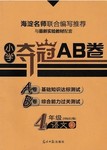题目内容
-The dish is delicious!
-Well, at least, it is ________ the one I cooked yesterday.
- A.not as bad as
- B.no worse than
- C.as well as
- D.no better than
no worse than表示:至少不比我昨天做的差。

 小学夺冠AB卷系列答案
小学夺冠AB卷系列答案Few people ever took notice of Mr. Jimmy Tan whenever he entered a room. He was a shy, quiet and simple man who preferred to keep to himself in public. On the other hand, Mr. Thomas Kim, a fellow scientist, was a man everyone would notice on the streets. He wore bright outfits with huge flower prints, spoke with a booming voice, and his laughter could be heard from all corners of a room. In addition to the differences in their characters, Mr. Kim and Mr. Tan were also great rivals at work in the Institute of Future Science.
On Christmas Eve, everyone left work early to celebrate the special occasion, except for Mr. Tan and Mr. Kim. They were in their laboratory analyzing the results of their latest experiments. Mr. Tan realized that something special was taking place in his experiment —the bacteria he had cultured were growing extremely quickly under high pressure and at a very low temperature. After noting down the findings in his notebook, he left the room to prepare for another round of tests. Shortly after, Mr. Kim entered.
“Hey Jimmy,” Mr. Kim called out, “do you have an extra copy of the laboratory booking form?”
There was no reply, so Mr. Kim looked through Mr. Tan’s things. He soon found Mr. Tan's notebook and was horrified to see that Mr. Tan had managed to make one of the most important discoveries in modern science. He then looked into the deep-freeze cupboard where a dish containing the bacteria was kept. He put them into his pocket and returned to his own laboratory.
Mr. Tan came back an hour later to find his notebook and the dish missing. He knew that Mr. Kim had taken them and went to Mr. Kim's laboratory to find out. When he opened the door, he found Mr. Kim lying on the floor motionless. His face was pale and his skin had turned black. The deadly bacteria had been handled improperly. He shook his head and left.
【小题1】From the first paragraph we know Mr. Kim was a quite person.
| A.famous | B.hardworking |
| C.wealthy | D.outgoing |
| A.enemies | B.colleagues |
| C.competitors | D.friends |
| A.the most important discoveries |
| B.the notebook and the dish |
| C.the cupboard and the bacteria |
| D.the dish and the bacteria |
| A.Mr. Kim was afraid Mr. Tan might succeed ahead of him. |
| B.Mr. Tan's bacteria grew very fast in a warm container. |
| C.Mr. Tan worked much harder than Mr. Kim. |
| D.Mr. Kim was so tired that he fell down into sleep. |
| A.He died on Christmas Eve. |
| B.He was arrested by the police. |
| C.He shared the success with Mr. Tan. |
| D.He succeeded ahead of Mr. Tan. |